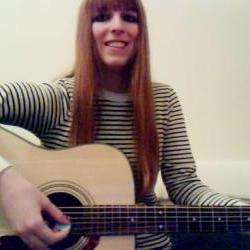The ceiling at the Clark Studio Theater was hung with white gauzy curtains descending all the way to the floor. The wispy fabric served as dividers between four stages, on which were arranged different combinations of instruments. The narrow rows of space between the curtains were lined with chairs for the 48 audience members, the lucky few who would get to witness the New York première of David Lang’s poetic whisper opera, directed by Jim Findlay. The seats were situated so close to the stage that a particularly flexible or fearless listener might prop their legs up on it, or reach their hand out to touch the feet – clad in socks but no shoes – of the performers padding across.
When I arrived at my own seat, I studied the cello and flutes waiting on the stage before craning my neck to see what the other stages might be hosting. It was at this point that I noticed the bass drum suspended directly above my head. The woman next to me commented “Gee, I hope that doesn’t fall”, and I tried to smile casually while resisting the urge to Google “annual deaths via percussion accidents” on my phone.
Google-generated search results were the fuel for Mr Lang’s opera. “What if there were a piece so quiet and so fragile that you had to be right next to it, or you’re not going to hear it at all?” was the question driving his compositional process as he compiled anonymous phrases from the internet. The result is a beautiful illustration of the impossibilities of human communication despite the advanced technology at our fingertips.
The whisper opera revolved around the secrets of strangers, though the phrases we strained to hear were taken from an even more public forum. To accumulate text for each movement of the libretto, Mr Lang searched four different unfinished phrases on Google and let the infinite voices of the internet finish the phrases: “when I am alone I always”, “they said I was crazy but I”, “when I think of you I think of”, and “it’s not my fault that I am so”. During the first movement, the four performers from the International Contemporary Ensemble – Kivie Cahn-Lipman, Claire Chase, Joshua Rubin, and Ross Karre – filed in, quiet as cats in their socks. Then they swirled the cymbals on each stage in a careful and almost inaudible metallic rhythm while finishing the first phrase in hushed tones.
When I am alone I always: “...feel like a different person”, “...wonder where my sister is”, Mr Rubin whispered, unnervingly making eye contact with the twelve audience members surrounding his stage. On the other stages, I could hear murmurs – “go to the casino”, “go to the commissary” – as a gentle hum began beneath the spindles of sound. “...think of him always”, I heard as my ears strained to figure out where and how all the sounds were being produced. It’s a testament to Mr Lang’s and Mr Findlay’s work that four individuals could so effectively personify the vastness of the internet.
Soprano Tony Arnold entered towards the end of the first movement, nearly hissing “think, think, think of you” and walking from stage to stage as the musicians began playing, whispering really, on their instruments: cello, flutes, clarinets, and percussion. The notes, barely eked out, were as exquisite as snowflakes as they trickled and tumbled down. During the second movement, “they said I was crazy but I”, Ms Chase lightly played the bass drum over my head while breathing out “shoot them all” and “I did it anyway”. I heard laughter on the opposite side of the room, where the atmosphere must have been slightly less chilling.
During the third movement, Ms Arnold stood in the middle of the stages, rotating her music stand four times so that she faced each group of audience members for a different portion. Meanwhile, the instrumentalists murmured out ethereal harmonies. The notes sighed and quavered beneath the words, the most peaceful and moving part of the opera. When I think of you I think of: “...all that we’ve been through”, “...life and how miserable –”, “sunny days, the greatest gift –”, “comfort, acceptance, and love”. Ms Arnold rattled out the memories of strangers while smiling down at us, then left the stage and relocated to the front of the room, behind the curtains.
The text of the final movement, “it’s not my fault that I am so”, was sung aloud in a stirring, if a bit cheesy, turn of events. “...so nervous”, “...so accident-proof”, “...so painfully ordinary”. Ms Arnold’s voice, suddenly not quiet or fragile at all, rang confidently across the musicians, still playing delicately underneath. I could have been eavesdropping on the thoughts and words of the other 47 audience members; I could have been listening to my own insecurities wafting between the curtains. It was a good weekend for sound in New York: to hear snippets of secrets and stories, and to be reminded of all that’s left to be heard.


